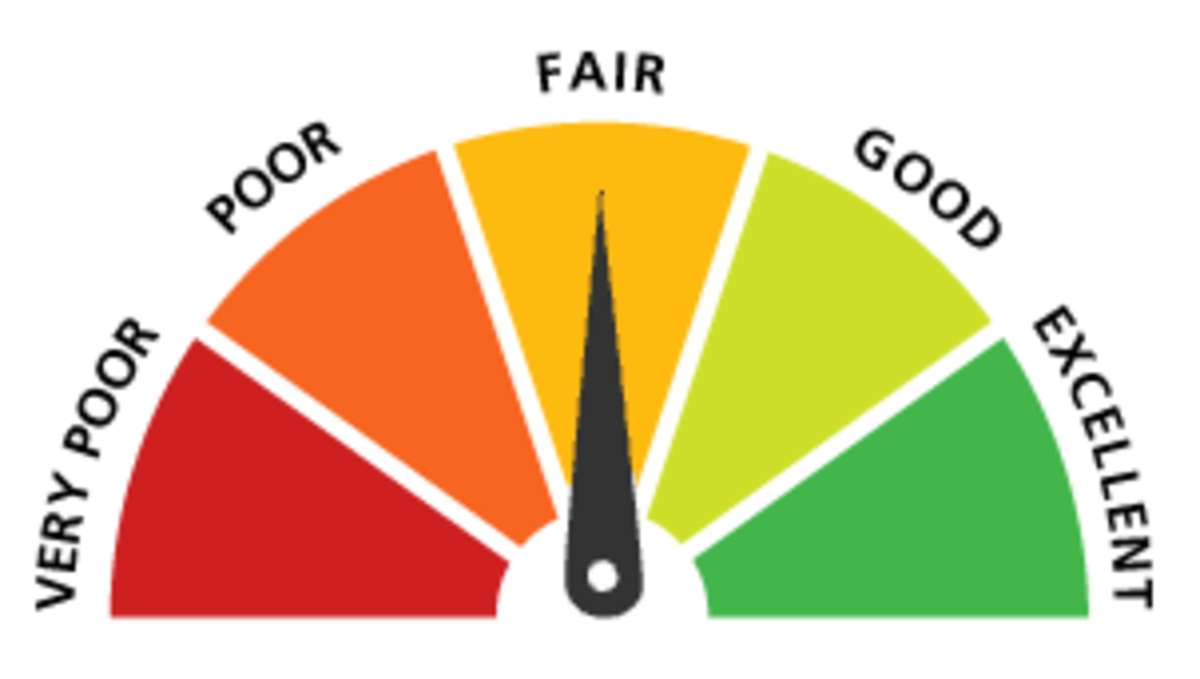What Is a Good FICO Score - Range Meaning- Credit
Knowing how healthy your own credit score is and how to keep a good, or even better, an excellent score, will ease your life and help you get rid of those worry lines on your forehead. The credit scoring system is easy to understand and although keeping a high score may not always be that easy, it's achievable!
FICO Score Meaning
Whenever you apply for a loan be it a car loan or a mortgage, the lender will look at your credit score which will be calculated statistically, with information from your credit files. Lenders use your credit history or credit report to evaluate whether a credit card, loan or mortgage you applied for should be approved. Your credit reputation will determine how much credit will be made available and under what terms (including the interest rate).
Not only banks and credit card issuers may consider your credit history, but also service providers and employers!
There are a few credit scoring systems, such as the VantageScore, NextGen score and CE Score, but the best-known and most widely used credit score model in the United States is the FICO score (the letters stand for Fair Isaac Corporation).
The credit score quantifies your probability of paying your debts based on a three digit number. The higher the credit score, the better your credit rating. FICO scores range from 300 (the lowest) to 850 (the highest).
Fico Score Range Meaning
Range
| Meaning
| Comment
|
|---|---|---|
740 & up
| Elite
| Some borrowers consider 750+ an excellent credit score.
|
700-739
| Prime
| Some borrowers consider 720 - 749 a good credit score.
|
660-699
| Preferred
| Preferred FICO score can be 660-719, depending on the borrower.
|
625-659
| Standard
| FICO score between 620 and 653 may be considered uncertain.
|
624 & under
| Sub-prime
| Most borrowers consider 619 under under a poor FICO score.
|

Before You Apply For a Credit
Before lending money, banks and other creditors investigate the consumer's credit history to make sure the borrower is likely to repay them. In other words, when somebody is applying for a credit (credit card, car loan, personal loan or mortgage), lenders will look at the credit report to determine the credit risk level.
Your Credit History
In the U.S., the borrowing behavior of each consumer is being tracked by the three major credit bureaus:
- Experian,
- Equifax and
- TransUnion.
The records include your previous behavior with money loans, whether you paid back on time, how much you may still owe and to whom you owe. These and other personal data are acquired from public records and companies including the credit reporting agency (existing creditors, companies with whom you applied for credit, and collection companies).
Credit Report Elements
Element
| Meaning
| |
|---|---|---|
(1) identifying information
| name, address, phone number, social security number, date of birth and spouse's name
| |
(2) account history
| individual account information such as the date when the account was opened, credit limit or loan amount, balance, monthly payment, payment status and payment history
| |
(3) data from public records
| federal bankruptcy records, tax liens, monetary judgments and overdue child support payments
|
(4) a record of inquiries into your credit history.
You can ask for a free copy of your credit report once every 12 months (credit bureaus must provide them free of charge according to the Fair Credit Reporting Act).
Not all lenders use a single cut off score; each lender has its own strategy and determines the level of risk for a given credit product.
How FICO Score Is Calculated
FICO score is based on all these categories and their belonging characteristics, not just one or two (although the importance of the categories may vary).
It is calculated from a lot of different credit data in your credit report. This data can be grouped into five categories and the percentages given below reflect the importance of each category in determining the FICO score for the general population:
- payment history (35%)
- amounts owed (30%)
- length of credit history (15%)
- new credit (10%)
- types of credit used (10%)
Each factor depends on the overall information in the credit report and it may vary for different credit profiles. One factor may be more important for some people and less important for other people with a different credit history.
The importance of the categories is also different for each individual over time; when the information in a credit report changes, so does the importance of any factor determining the FICO score.
Having a solid credit history with a FICO credit score over 720 makes it possible to save money, get low-interest mortgages and loans, lower APR credit cards, better insurance rates and even jobs.
Note that the free annual credit reports provided by Experian, Equifax and TransUnion don't include the consumer's credit score. Free credit reports provide a list of accounts and based on these, consumers can confirm that there is no erroneous information in the reports.
How Important Is Each Factor For General Population
The levels of importance for the general population are:
- payment history
Late payments have a negative impact on the credit score, and therefore on credit reports, but establishing or re-establishing a positive track record of on-time made payments will raise your FICO credit score. The category of payment history includes the following factors:
- account payment information on specific types of accounts (credit cards, retail accounts, installment loans, finance company accounts, mortgage, etc).
- number of accounts paid.
- public records (bankruptcy, judgements, suits, liens, wage attachments, collection items and past due times a.k.a delinquency, etc).
- amount past due on delinquent accounts or collection items
- time (recency of past due items (delinquency), adverse public records, and (potentially) collection items.
- number of past due items on file.
- debt or amounts owed
Includes:
- Length of credit history (how long have you had credit or credit card, etc.)
- How much you owe on accounts
- How much you owe on specific types of accounts (e.g. credit cards)
- Existence or lack of a specific type of balance
- Number of accounts with balances
- Proportion of credit lines used (proportion of balances to total credit limits on certain types of revolving accounts)
- Proportion of installment loan debt (certain types of installment loans include the proportion of balance to original loan amount).
- length of credit history
The category of credit history length depends on Time in file (how much time has passed since you´ve opened accounts - by specific type of account - and time since the last account activity.
- new credit
New credit includes information on credit diversity (different types of credit experience):
-
The number and proportion of recently opened accounts, by specific type of account
-
Number of recent credit inquiries
-
Time since recent account openings (by specific type of account) and time since credit inquiries
-
Re-establishment of positive credit history (if the borrower had payment problems in the past)
- types of credit used
Recent information on various types of accounts: presence, number and prevalence of credit cards, retail accounts, installment loans, mortgage, consumer finance accounts, etc.)
- How to Claim Tax Deductions on Charity Contributions?
Charity contributions are tax deductible - donations can reduce your taxable income and lower your tax bill. Learn how to claim tax deductions on charity contributions.
FICO score above 650 indicates good credit history and the score below 620 can make it difficult to obtain financing at a favorable rate. A simple FICO score definition takes into account 5 important factors to determine credit risk: payment history, current level of indebtedness, length of credit history, types of credit used, and new credit. If you do your best to make these factors favorable, you'll achieve a good FICO score and make your life easier to live.








